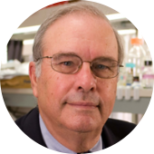
E. Aubrey Thompson, PhD
Titles and Affiliations
Professor of Cancer Biology
Co-director, Breast Cancer Translational Genomics Initiative
Mayo Clinic Comprehensive Cancer Center
The Play for P.I.N.K. Delaire Country Club Award
Areas of Focus
- Metastasis
- Treatment
- Tumor Biology
Research area
Understanding how breast tumor cells and immune cells interact and how this affects response to treatment.
Impact
The immune environment within a tumor affects how the tumor responds to chemotherapy and/or targeted treatments. Moreover, the interactions between cancer cells and immune cells also serve as targets for immunotherapies, such as checkpoint inhibitors. Dr. Thompson’s BCRF research is focused on understanding the relationship between response to therapy and the numbers, types, locations, and activities of immune cells in patients with aggressive breast cancers. These studies will provide fundamental new insight in tumor cell-immune cell interaction in high-risk breast cancer subtypes, as well as identify novel biomarkers and potential new therapeutic targets.
Progress Thus Far
Dr. Thompson’s focus is on early-stage triple-negative breast cancer (TNBC). He and his team analyzed the relationship between the immune landscape of TNBC and clinical outcome using emerging spatial biology technology. With this technique, they can map the abundance of immune and other tumor-related proteins within tumor microenvironments. A major focus has been on PD-L1, an immune regulatory protein that is expressed at high levels (PD-L1 positive) in some breast cancers and blocks the immune system from fighting tumor cells. Dr. Thompson found several key immune features that are associated with PD-L1 positivity and may be used to predict response to PD-L1 inhibitors TNBC. He and his team also successfully used their spatial profiling technology to identify features that are associated with durable recurrence-free survival in early-stage TNBC.
What’s next
In the upcoming year, Dr. Thompson will perform single-cell spatial analysis of early-stage TNBC samples to identify cellular and molecular features that are associated with resistance to immune-targeting agents. In addition, Dr. Thompson will analyze the immune landscape of early-stage TNBC and early-stage HER2-positive breast cancers that have been treated with the current standard of care for those subtypes to assess the effects of treatment.
Biography
Dr. Thomspon’s core expertise is in cancer genomics. He was a project leader on the FDA-funded MAQCIII project. His was one of three laboratories world-wide to be designated as a primary sequencing lab for this international collaborative study. A member of the breast cancer analytical working group of The Cancer Genome Atlas project, Dr. Thompson heads the breast cancer fusion transcript subgroup. For almost 40 years this work has focused on gene structure and function within the context of the malignant phenotype, with an emphasis on breast cancer. As co-director of the Mayo Clinic Breast Cancer Translational Genomics program, Dr. Thompson coordinates the efforts of a team of highly committed individuals with expertise in computation, biostatistics, bioinformatics, functional genomics, database management, and clinical management of breast cancer patients. This team’s work represents a broad range of collaborations, including basic mechanistic studies, clinical translational studies with a strong focus on analysis of clinical samples and practice-changing discoveries, and development of new tools for genomic analysis. Dr. Thompson’s work is highly translational in nature, and he is motivated by the concept that more effective clinical management of breast cancer requires a more detailed understanding of the biology that underlies the disease. A major objective is to define the genomic architecture of HER2-positive breast cancer, to use this genomic information to identify the biological processes that are associated with clinical outcome, and to use these biological processes to elucidate the biological and genomic basis of therapeutic response.
